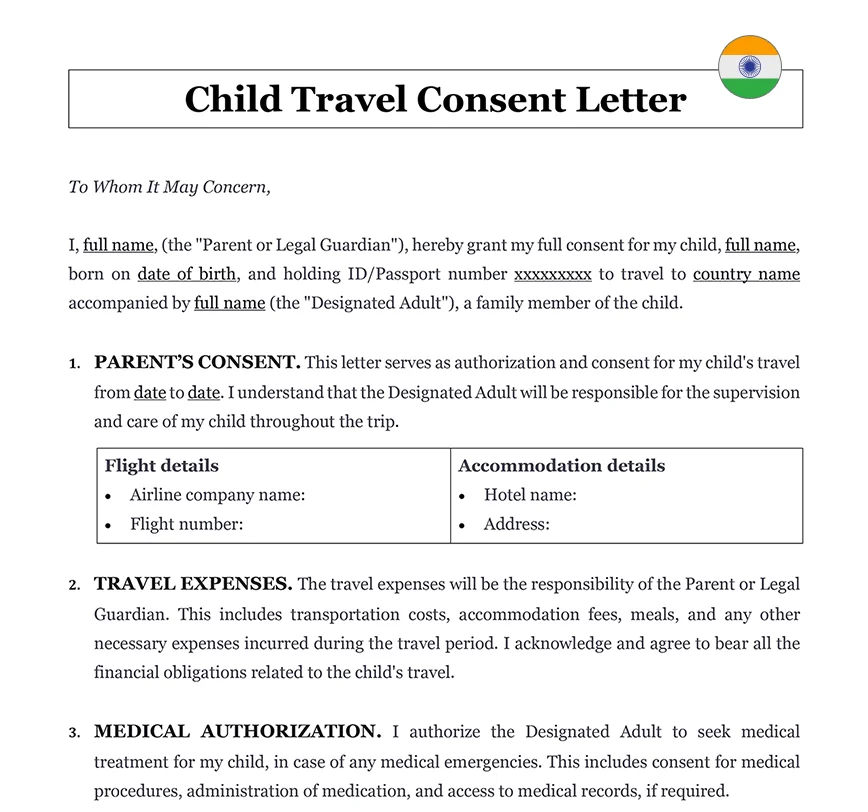Ready to use legal template
Drafted by experienced lawyers
Compliant with Indian law
Ready to use legal template
Drafted by lawyers
Compliant with Indian law
Home › Family Law › Child Travel Consent
Learn more about Child Travel Consent in India
A Child Travel Consent is a legal document that grants permission for a minor to travel domestically or internationally without both parents or legal guardians present. It is an essential document to ensure that the accompanying adult has legal authority to travel with the child, preventing any legal complications at immigration checkpoints. In India, a Child Travel Consent is often required for minors traveling alone, with one parent, or with someone other than their legal guardian. Whether for vacations, study trips, or family visits, having a properly drafted Child Travel Consent provides peace of mind to parents or guardians and ensures a smooth travel experience. Download our Child Travel Consent Letter, easy to edit in Word format, expertly drafted to travel in and from India.
📄 Related documents
Table of contents
What is a Child Travel Consent Letter?
A Child Travel Consent Letter is a legal document signed by a child’s parent(s) or legal guardian(s) granting permission for the child to travel internationally in the company of an adult who is not the child’s parent or legal guardian.
This letter is a precautionary measure to address potential concerns at border crossings and immigration checkpoints. It typically includes important details such as the child’s name, date of birth, passport information, details of the accompanying adult, travel dates, destination, and a clear statement of consent from the parents or guardians. The letter is designed to demonstrate that the child’s travel is authorized by those with legal authority over them, ensuring a smooth and legally compliant travel experience. In some cases, the document may need to be notarized for additional legal validity, and the specific requirements can vary by country.
When is a Child travel Consent used?
A child travel consent is typically used in situations where a child is traveling internationally or domestically without one or both of their legal parents or guardians. It is required to provide evidence that the child has obtained permission from their parent(s) or legal guardian(s) to travel with another adult or group. Here are some common scenarios when a child travel consent is used:
1. Traveling with Relatives: If a child is traveling with grandparents, aunts, uncles, cousins, or other relatives, a child travel consent may be required. This is especially important when crossing international borders, as immigration officials may request proof of consent from the child’s parents or legal guardians.
2. Traveling with Friends: When a child is going on a trip with friends and their families, a child travel consent may be necessary. This could include school trips, sports events, or vacations where the child will be under the supervision of someone other than their parents or legal guardians.
3. School Trips: Schools often require parental consent for children to participate in field trips, excursions, or educational trips outside the school premises. A child travel consent may be required to authorize the child’s participation and grant permission for travel with teachers or chaperones.
4. Custody or Visitation Arrangements: In situations where there is shared custody or visitation rights, a child travel consent may be necessary when one parent is traveling with the child outside their usual jurisdiction or when the child is traveling with the non-custodial parent.
5. Traveling Alone as an Unaccompanied Minor: In some cases, when a child is traveling alone as an unaccompanied minor, airlines or transportation providers may require a child travel consent. This ensures that the child has permission to travel alone and specifies any additional requirements or restrictions.
6. Group Travel: If a child is participating in organized group travel, such as with a youth organization, sports team, or religious group, a child travel consent may be needed. This grants permission for the child to travel with the group and its designated leaders or supervisors.
It’s important to note that the specific requirements for child travel consent may vary depending on the country, airline policies, and the age of the child. It is advisable to check the regulations and recommendations of the relevant authorities and transportation providers involved in the travel arrangements to ensure compliance with the necessary consent requirements.
Who should sign the Child Travel Consent Letter for children?
The Child Travel Consent Letter should typically be signed by both parents or legal guardians of the child. The consent of both parents is generally considered necessary to ensure that both individuals with legal authority over the child have agreed to and authorized the international travel.
In situations where one parent has sole legal custody or the other parent is unavailable or unable to provide consent, the traveling parent or guardian should make efforts to obtain legal documentation supporting their authority to make decisions for the child, such as a court order or custody decree.
What should a Child Travel Consent include?
A child travel consent should include certain key information to ensure its effectiveness and validity. While the specific requirements may vary depending on the jurisdiction and the circumstances of the travel, here are the essential elements that should be included in a child travel consent:
Child’s Information: Include the full name of the child, date of birth, passport or identification details, and any relevant medical information or special needs.
Parent/Guardian Information: Provide the full names, contact details, and signatures of the parent(s) or legal guardian(s) who are granting consent for the child to travel. If applicable, mention any custody or visitation arrangements that may be relevant.
Accompanying Adult’s Information: Include the full name, contact details, and relationship to the child of the adult(s) who will be accompanying the child during the trip. If the child is traveling with a group or organization, include the contact details of the responsible adult or group leader.
Travel Details: Specify the dates of travel, destination(s), and purpose of the trip. If there are multiple destinations or if the child will be crossing international borders, provide specific details for each leg of the journey.
Consent Statement: Clearly state that the parent(s) or legal guardian(s) grant permission for the child to travel with the specified accompanying adult(s) or group. This statement should be unambiguous and unequivocal.
Emergency Contacts: Include contact information for the parent(s) or legal guardian(s) who can be reached in case of an emergency or if authorities need to contact them during the child’s travel.
Notarization or Certification: Depending on the requirements of the jurisdiction or the travel authorities involved, it may be necessary to have the consent letter notarized or certified by a relevant authority, such as a notary public or a consular office. This can enhance the authenticity and acceptance of the consent letter.
Supporting Documentation: It is advisable to attach copies of relevant identification documents, such as the child’s passport or birth certificate, and the parent(s) or legal guardian(s)’ identification documents to further support the consent letter.
It is crucial to research and understand the specific requirements of the relevant authorities involved in the travel process. Some jurisdictions may have specific templates or additional documentation requirements for child travel consent. It is recommended to consult with legal professionals or check with the relevant embassy, consulate, or airline for specific guidelines and any additional documents that may be needed for the child’s travel consent.
What if I don't use a Child Travel Consent ?
If you don’t use a child travel consent when it is required or recommended, it can lead to various complications and potential problems. Here are some potential consequences of not using a child travel consent:
1. Entry and Exit Issues: When crossing international borders, immigration officials may request proof of consent from the child’s parents or legal guardians. Without a child travel consent, the accompanying adult(s) may encounter difficulties or delays at border checkpoints. The child may be denied entry or exit from a country, resulting in disruption to travel plans.
2. Legal and Custody Concerns: In situations where there are custody or visitation arrangements in place, not having a child travel consent could raise legal issues. It may violate court orders or custody agreements, leading to potential legal consequences or disputes between the parents or legal guardians.
3. Safety and Protection: A child travel consent helps ensure the safety and protection of the child during the trip. It establishes the authorized individuals responsible for the child and provides contact information in case of emergencies. Without a consent letter, there may be confusion or uncertainty about who is responsible for the child’s well-being and how to contact the child’s parents or legal guardians in case of any issues or emergencies.
4. Airline and Transportation Policies: Many airlines and transportation providers have specific policies regarding child travel consent. If you do not comply with these requirements, the airline or transportation provider may refuse boarding or may have restrictions on allowing the child to travel without proper consent.
5. Disputes and Challenges: In the absence of a child travel consent, disputes or challenges may arise regarding the child’s custody, travel arrangements, or the legitimacy of the accompanying adult(s). This can lead to complications, conflicts, and potentially legal actions to resolve the issues.
It’s important to note that the specific requirements for child travel consent may vary depending on the jurisdiction and the circumstances of the travel. It is advisable to research and understand the regulations and recommendations of the relevant authorities, such as immigration offices and transportation providers, to ensure compliance and avoid potential problems.
Child Travel ConsentTemplate (.docx)
Save on attorney fees
310 client reviews (4.8/5) ⭐⭐⭐⭐⭐
Share information
Why Themis Partner ?
Make documents forhundreds of purposes
Hundreds of documents
Instant access to our entire library of documents for India.
24/7 legal support
Free legal advice from our network of qualified lawyers.
Easily customized
Editable Word documents, unlimited revisions and copies.
Legal and Reliable
Documents written by lawyers that you can use with confidence.




